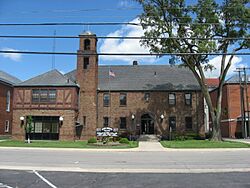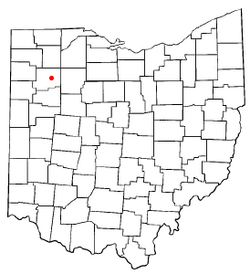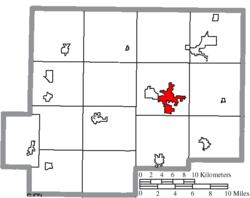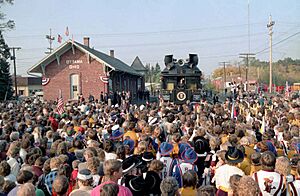Ottawa, Ohio facts for kids
Quick facts for kids
Ottawa, Ohio
|
|
|---|---|
|
Village
|
|

Ottawa Village Hall
|
|

Location of Ottawa, Ohio
|
|

Location of Ottawa in Putnam County
|
|
| Country | United States |
| State | Ohio |
| County | Putnam |
| Area | |
| • Total | 4.61 sq mi (11.95 km2) |
| • Land | 4.55 sq mi (11.78 km2) |
| • Water | 0.07 sq mi (0.17 km2) 1.47% |
| Elevation | 732 ft (141.7 m) |
| Population
(2020)
|
|
| • Total | 4,456 |
| • Density | 979.99/sq mi (378.34/km2) |
| Time zone | UTC-5 (EST) |
| • Summer (DST) | UTC-4 (EDT) |
| ZIP code |
45875
|
| Area code(s) | 419 |
| FIPS code | 39-58982 |
| GNIS feature ID | 2399596 |
| Website | http://www.ottawaohio.us |
Ottawa is a small village in Ohio, United States. It is the main town, also called the county seat, of Putnam County, Ohio. Ottawa is located about 51 miles (82 km) southwest of Toledo. In 2020, about 4,456 people lived there.
Contents
History of Ottawa

For a long time, the land where Ottawa is now was home to Native American tribes. These included the Wyandot and Ottawa people. They lived along the Blanchard River.
In 1792, President George Washington sent a group to talk with the tribes. Sadly, two members of this group, Major Alexander Truman and William Lynch, were killed near an Ottawa village. This village was called Lower Tawa Town. The Ottawa County Courthouse now stands where this event happened.
Tribal Lands and Treaties
During the War of 1812, many tribes joined with the British. They hoped this would help them keep European Americans from taking their lands. But the pressure continued, and in 1817, the tribes gave up a large area of land in Northwestern Ohio to the United States.
A special area called Blanchard's Fork Reserve was created. However, in 1831, during a time called Indian Removal, the tribes had to give up this Reserve too. Their claims to land in Ohio ended. The Ottawa people living on that Reserve moved to what is now Kansas in 1832. The village of Ottawa, Ohio, grew from one of the two Ottawa villages that were once in the Reserve.
Early European-American Settlers
One of the first European-American families to settle in the Ottawa area was Henry Kohls' family. They arrived in 1835. Later, in the early 1900s, Henry's grandsons, Charles and Frank Kohls, both became the treasurer for Putnam County. They even helped each other by appointing one another as chief deputy.
Ottawa officially became a village in 1861. This was at the very beginning of the American Civil War.
Geography of Ottawa
Ottawa covers a total area of about 4.77 square miles (12.35 square kilometers). Most of this area, about 4.70 square miles (12.17 square kilometers), is land. A small part, about 0.07 square miles (0.18 square kilometers), is water.
Population and People
| Historical population | |||
|---|---|---|---|
| Census | Pop. | %± | |
| 1850 | 104 | — | |
| 1870 | 1,129 | — | |
| 1880 | 1,293 | 14.5% | |
| 1890 | 1,717 | 32.8% | |
| 1900 | 2,322 | 35.2% | |
| 1910 | 2,182 | −6.0% | |
| 1920 | 2,167 | −0.7% | |
| 1930 | 2,169 | 0.1% | |
| 1940 | 2,342 | 8.0% | |
| 1950 | 2,962 | 26.5% | |
| 1960 | 3,870 | 30.7% | |
| 1970 | 3,622 | −6.4% | |
| 1980 | 3,874 | 7.0% | |
| 1990 | 3,999 | 3.2% | |
| 2000 | 4,367 | 9.2% | |
| 2010 | 4,460 | 2.1% | |
| 2020 | 4,456 | −0.1% | |
| U.S. Decennial Census | |||
Most people in Ottawa speak English as their first language (95.3%). A smaller number speak Spanish (4.2%) or German (0.5%).
Ottawa in 2010
In 2010, there were 4,460 people living in Ottawa. There were 1,829 homes, and 1,207 of these were families. The village had about 949 people per square mile (366 people per square kilometer).
Most of the people living in Ottawa were White (92.5%). Some were African American (0.8%), Native American (0.4%), or Asian (0.3%). About 10.3% of the population identified as Hispanic or Latino.
About 32.4% of homes had children under 18 living there. Many homes (50.1%) were married couples. The average age of people in the village was 38.8 years old.
Education in Ottawa
The Ottawa-Glandorf Local Schools runs the local high school, Ottawa-Glandorf High School, in the village.
Ottawa also has a public library. It is a part of the Putnam County District Library system.
Notable People from Ottawa
Many interesting people have connections to Ottawa:
- Tanner Buchanan, an actor.
- Larry Cox, a baseball player for the Chicago Cubs and later a coach.
- Edward Settle Godfrey, a United States Brigadier General.
- Charles N. Haskell, a politician and oilman. He was the first governor of Oklahoma and lived in Ottawa for many years.
- Frances Horwich, a television performer famous for Ding Dong School. A monument to her was put up in Ottawa in 2006.
Media
- WJTA is a radio station located in Ottawa.
See also
 In Spanish: Ottawa (Ohio) para niños
In Spanish: Ottawa (Ohio) para niños

